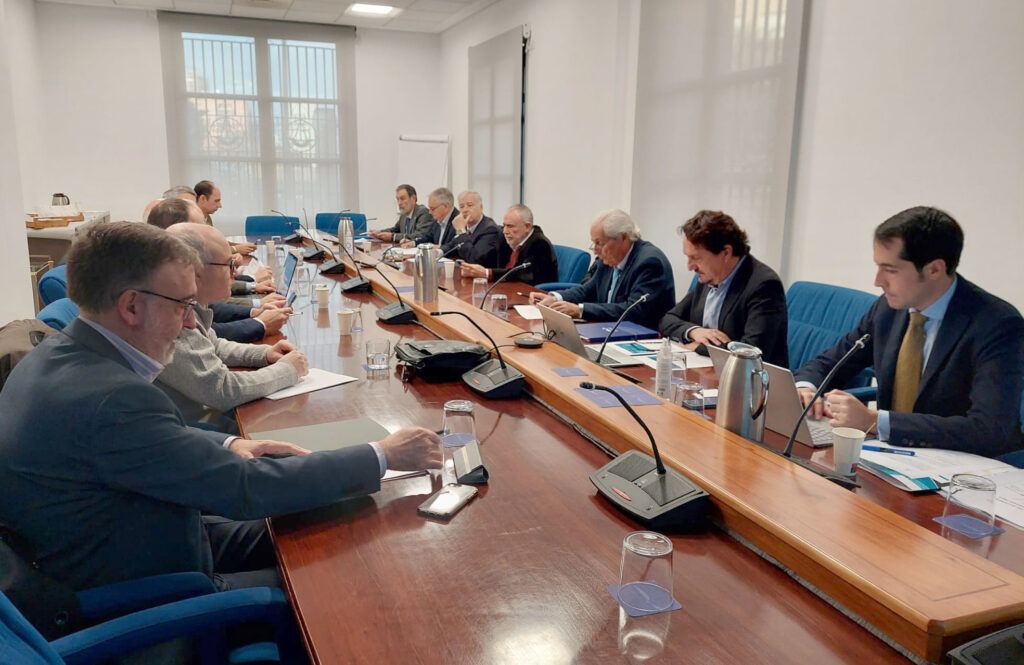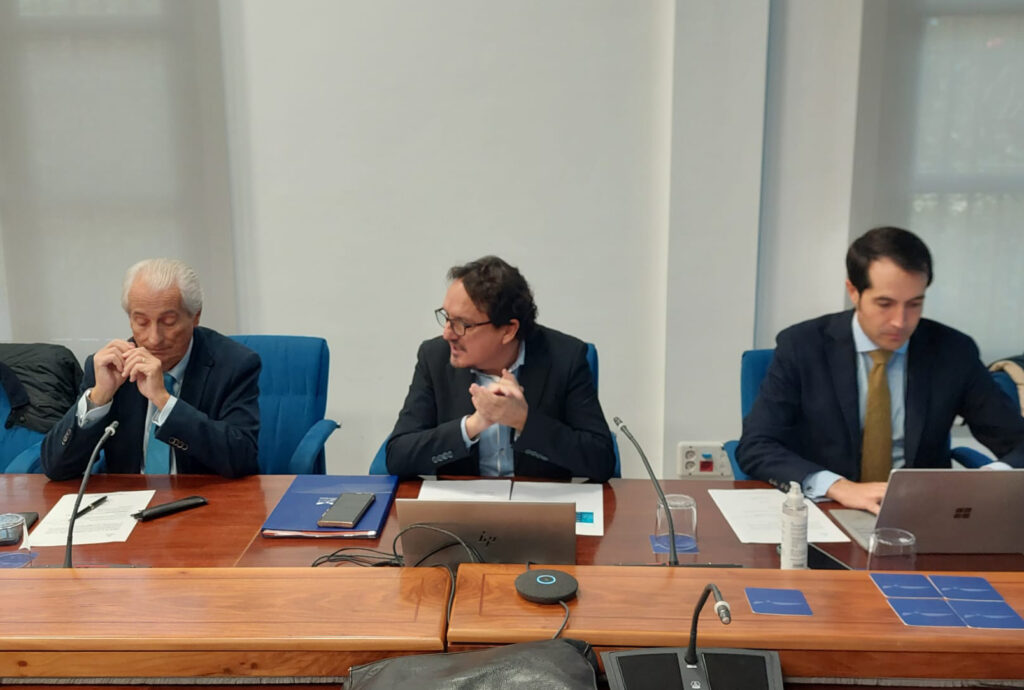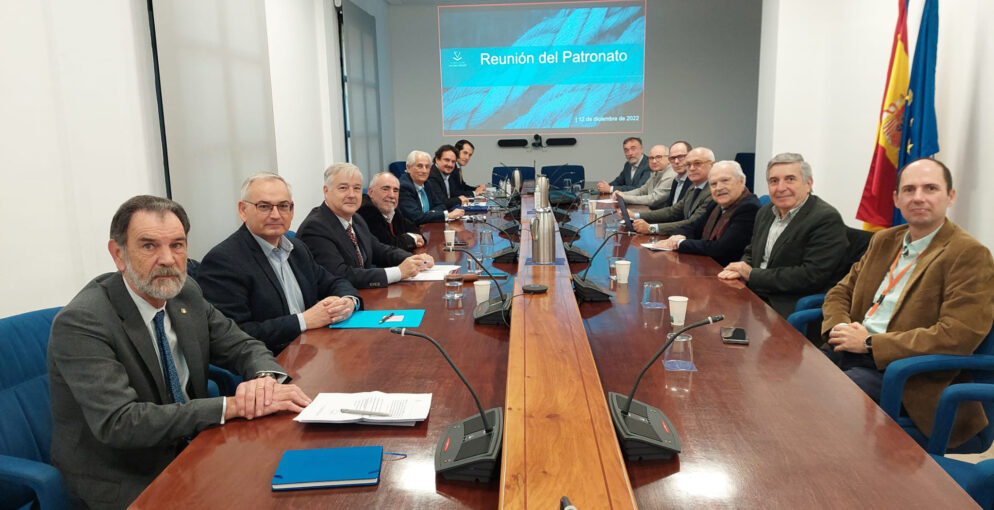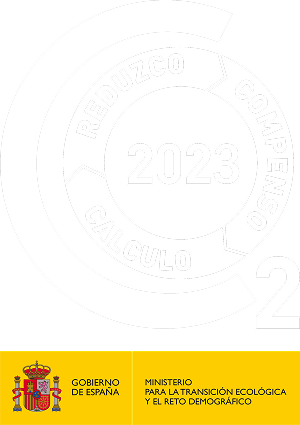Valencia, 12 December 2022. – This morning, Fundación Valenciaport held the ordinary meeting of its board of trustees to approve the action plan and budgets for the 2023 financial year, with the planned level of activity amounting to 6,688,846 euros.
In the director’s report, Antonio Torregrosa highlighted as a milestone the 48 innovation projects in which the entity participated or coordinated during 2022. Specifically, these include twenty-six projects of the Horizon 2020 / Horizon Europe programme, eight CEF projects, four Interreg-MED projects, two ENI CBCMED projects, one EIT Climate-KIC project, one Erasmus + project, four projects funded by the Valencian Innovation Agency (AVI), one SUDOE project and one Ports 4.0 project. With these excellent results, the Valenciaport Foundation continues to maintain the growth of the last three years, with a total of 23 more projects than in 2018.
Torregrosa also explained to the members of the Board of Trustees the objectives of the four projects approved in the second half of the year, three of them funded by the Horizon Europe programme: AENEAS, an initiative that aims to contribute to climate-neutral and environmentally friendly water transport through next-generation clean energy storage solutions; IMAGINE-B5G, which aims to create an advanced and accessible end-to-end (E2E) 5G platform for large-scale trials and pilots, providing a set of B5G applications, enabled by the integration of advanced disruptive 5G technologies; and SEAMLESS, which aims to develop an innovative model of a feeder maritime service by building a prototype of an autonomous vessel capable of operating in such service in both maritime and river routes. This concept will also include an economic feasibility study to assess the suitability of its application in Short Sea Shipping routes. Finally, he detailed the VET_LOGGIC project, financed by the Erasmus + programme, which will strengthen the vocational education and training (VET) system in two Latin American coastal countries (Costa Rica and Colombia) relevant to maritime transport and international trade, thanks to a 3-axis methodology based on education and innovation, governance, and the relationship with the labour market.
In terms of open innovation, Torregrosa highlighted the launch of Opentop’s first Startup Incubation Programme, which began last October with the 5 startups selected (Metric Salad, Desafío en Azul, We are Lab, Code Contract and NAVEL); the success of the Ports & Logistics forum organised by Opentop within the framework of the Valencia Digital Summit and the 1st Opentop Innovation Workshop, held in November at Innsomnia’s facilities; as well as the launch of the first Startup Acceleration Call, which has just closed the registration period and whose programme will start in January with the new startups selected.
With regard to international cooperation, Torregrosa highlighted the two technical assistance projects recently contracted by the Inter-American Development Bank (IDB): the study of the improvement of the productivity and competitiveness of the ports in Latin America and the Caribbean, and the transformation of the Port of Acajutla (El Salvador) into a smart port; the start-up of the technical assistance contracted by the Port of Bahía Blanca (Argentina), which includes the preparation of the environmental report, the obtaining of PERS certification, advice for the creation of an environmental group in the port community and the implementation of an Action Plan for the development of future strategies; and the success of the assistance in energy efficiency, calculation of the carbon footprint and decarbonisation alternatives for the port and inland terminals of CMA CGM.
In relation to the training area, the director emphasised the recent approval of Fundación Valenciaport as a Railway Training Centre, which will allow them to train future train drivers from 2023, as well as the upcoming launch of the Maritime Signalling and Navigation Aid Programme for Port Authorities, a course endorsed by Puertos del Estado which will be taught in virtual format and which will also include 3 weeks in person, one in Madrid and two in Valencia. Torregrosa also reported on the new developments in the visualisation and documentation of Dual Vocational Training content, which will be launching an ERP for the management of international trade, developed thanks to an agreement with the GVA and the Port of Valencia. In addition, Fundación Valenciaport is working on building the Classroom of the Future, with the aim of including simulators, digital twins, and other advances in digitalisation to support vocational training and to be able to apply it later in other training courses. With regard to postgraduate training, the director highlighted the recent launch of the 31st edition of the Master’s Degree in Port Management and Intermodal Transport in Valencia and the 3rd edition of the Master’s Degree in Logistics and Port Management in Brazil..
Finally, the director, as is now traditional, has specified in figures the great benefit for the port logistics cluster as a whole of the work carried out by Fundación Valenciaport team, highlighting the 33.6 million euros of budget promoted during 2022 by the Foundation for the development of European projects, 29.4 of which, as direct funding for the cluster for the implementation of improvements and innovations in infrastructure and technology in their areas of activity.




